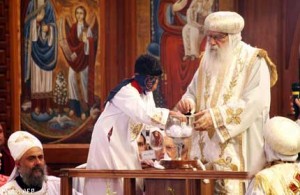From the First Letter of John:
Beloved, do not believe every spirit, but test the spirits to see whether they are from God; for many false prophets have gone out into the world.
(From the Daily Office Lectionary – 1 John 4:1 (NRSV) – February 24, 2014.)
 How does one “test the spirits”? How does one divine the promptings of the spirit or determine the will of God? That’s always the question we must face. In the ancient tabernacle, the high priest’s vestments included a breastplate in which he kept a couple of stones called the urim and the thummim (Exodus 28:30). What those were is a subject of much speculation, but one theory is that they were sort of like dice. The belief is that the high priest cast these dice to determine God’s guidance, to “test the spirit” when faced with a difficult decision.
How does one “test the spirits”? How does one divine the promptings of the spirit or determine the will of God? That’s always the question we must face. In the ancient tabernacle, the high priest’s vestments included a breastplate in which he kept a couple of stones called the urim and the thummim (Exodus 28:30). What those were is a subject of much speculation, but one theory is that they were sort of like dice. The belief is that the high priest cast these dice to determine God’s guidance, to “test the spirit” when faced with a difficult decision.
Today is the feast of St. Matthias, who was selected by the eleven remaining apostles to replace Judas and restore their number to 12. Why they believed this was necessary would be an interesting subject of speculation, but what’s on my mind this morning is the method of selection. To “test the spirit,” to gain God’s guidance, they drew lots, much like casting dice:
They proposed two, Joseph called Barsabbas, who was also known as Justus, and Matthias. Then they prayed and said, “Lord, you know everyone’s heart. Show us which one of these two you have chosen to take the place in this ministry and apostleship from which Judas turned aside to go to his own place.” And they cast lots for them, and the lot fell on Matthias; and he was added to the eleven apostles. (Acts 1:23-26)
In the Episcopal Church, we use a rather lengthier process to select the successors of the apostles. Our method of choosing bishops includes appointment of nominating or screening committees, reception of nominations and applications, interviews, “meet-and-greet” tours (some refer to these as “dog-and-pony shows”), electing conventions, and finally approvals by other dioceses’ Standing Committees and bishops.
I’m told that in some Oriental Orthodox churches the method is more like that used by the eleven in today’s story from acts. The names of all clergy eligible to be bishop are written on slips of paper and placed in a chalice. A young child (sometimes blindfolded) is then asked to draw out a slip, and the named clergy person becomes the bishop. This is the manner in which the pope of the Coptic Orthodox Church is selected.
Does our lengthy (some might suggest inordinately long) process produce better apostles, better bishops than the drawing of lots? Does it “test the spirits” any more accurately than the casting of dice? One cannot say, but it’s a question to ponder on this feast of Matthias.
====================
Father Funston is the rector of St. Paul’s Episcopal Church, Medina, Ohio.



Leave a Reply